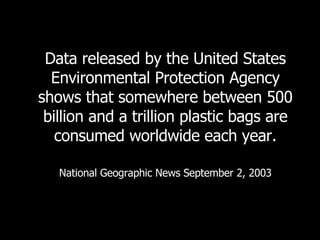
Think Twice Before Using another Plastic Bag!
- 1. Data released by the United States Environmental Protection Agency shows that somewhere between 500 billion and a trillion plastic bags are consumed worldwide each year. National Geographic News September 2, 2003
- 2. Less than 1% of bags are recycled. It cost more to recycle a bag than to produce a new one. - Christian Science Monitor News Paper
- 3. “ There's harsh economics behind bag recycling: It costs $4,000 to process and recycle 1 ton of plastic bags, which can then be sold on the commodities market for $32” - Jared Blumenfeld (Director of San Francisco's Department of the Environment)
- 4. Then… Where Do They Go?
- 5. A study in 1975, showed oceangoing vessels together dumped 8 million pounds of plastic annually. The real reason that the world's landfills weren't overflowing with plastic was because most of it ended up in an ocean-fill - U.S. National Academy of Sciences
- 6. Bags get blown around…
- 7. … to different parts of our lands
- 8. … and to our seas, lakes and rivers.
- 9. Bags find their way into the sea via drains and sewage pipes - CNN.com/tecnhology November 16, 2007
- 10. Plastic bags have been found floating north of the Arctic Circle near Spitzbergen, and as far south as the Falkland Islands - British Antarctic Survey
- 11. Plastic bags account for over 10 percent of the debris washed up on the U.S. coastline - National Marine Debris Monitoring Program
- 12. Plastic bags photodegrade: Over time they break down into smaller, more toxic petro-polymers - CNN.com/tecnhology November 16, 2007
- 13. which eventually contaminate soils and waterways - CNN.com/tecnhology November 16, 2007
- 14. As a consequence microscopic particles can enter the food chain - CNN.com/tecnhology November 16, 2007
- 15. The effect on wildlife can be catastrophic - World Wildlife Fund Report 2005
- 16. Birds become terminally entangled - World Wildlife Fund Report 2005
- 18. Nearly 200 different species of sea life including whales, dolphins, seals and turtles die due to plastic bags - World Wildlife Fund Report 2005
- 19. They die after ingesting plastic bags which they mistake for food - World Wildlife Fund Report 2005
- 20. So… What do we do?
- 21. If we use a cloth bag, we can save 6 bags a week
- 22. That's 24 bags a month
- 23. That's 288 bags a year
- 24. That's 22,176 bags in an average life time
- 25. If just 1 out of 5 people in our country did this we would save 1,330,560,000,000 bags over our life time
- 26. Bangladesh has banned plastic bags - MSNBC.com March 8, 2007
- 27. China has banned free plastic bags - CNN.com/asia January 9, 2008
- 28. Ireland took the lead in Europe, taxing plastic bags in 2002 and have now reduced plastic bag consumption by 90% - BBC News August 20, 2002
- 29. In 2005 Rwanda banned plastic bags - Associated Press
- 30. Israel, Canada, western India, Botswana, Kenya, Tanzania, South Africa, Taiwan, and Singapore have also banned or are moving toward banning the plastic bag - PlanetSave.com February 16, 2008
- 31. On March 27th 2007, San Francisco becomes first U.S. city to ban plastic bags - NPR.org (National Public Radio)
- 32. Oakland and Boston are considering a ban - The Boston Globe May 20, 2007
- 33. Plastic shopping bags are made from polyethylene: a thermoplastic made from oil - CNN.com/tecnhology November 16, 2007
- 34. Reducing plastic bags will decrease foreign oil dependency
- 35. China will save 37 million barrels of oil each year due to their ban of free plastic bags - CNN.com/asia January 9, 2008
- 36. It is possible ...
